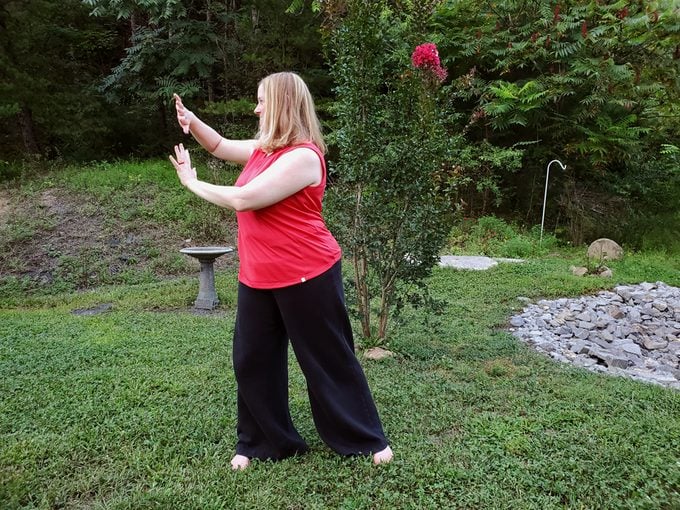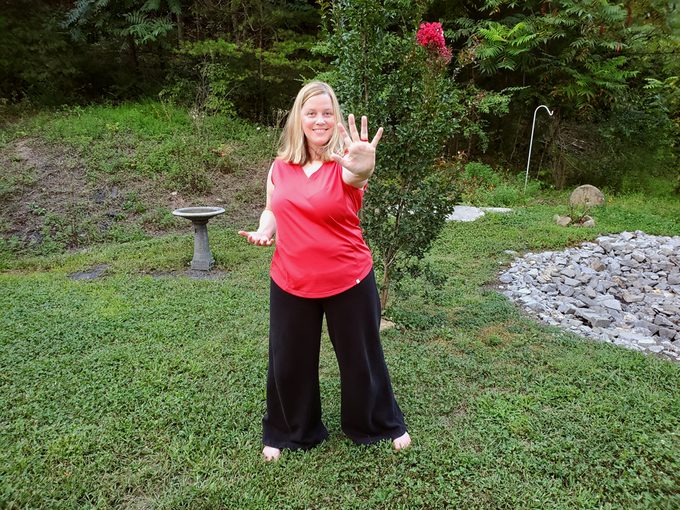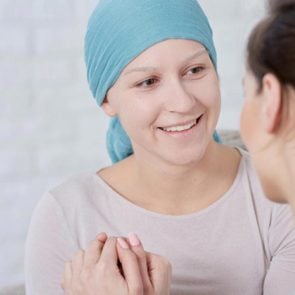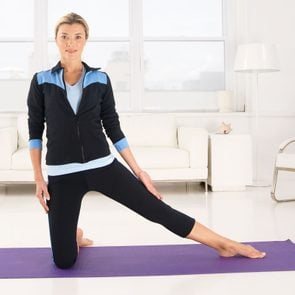Here’s How Qigong Helped Me Heal After Trauma
Updated: Sep. 01, 2020
Reeling from the physical and emotional effects of breast cancer treatment, a woman shares the gentle exercise solution that opened the door to a happier and more confident future.
In 2020, about 1.8 million people will be diagnosed with cancer in the United States, according to the National Cancer Institute. Nearly 1.2 million of those patients will survive and recover, but not without consequence: Cancer diagnoses can cause anxiety, distress, and depression in addition to the physical side effects of treatment.
When Lori Frye, 40, successfully completed her breast cancer treatments in 2018, she was withdrawn, disconnected from those around her, and living in fear. Then she found qigong, an ancient Chinese wellness practice similar to tai chi. Qigong has been found to curb anxiety, improve nervous system balance, reduce depression, and help manage type 2 diabetes, among other benefits. Here, Frye shares how the practice helped her reconnect with her body, shake off stress, build strength, and banish her fear.

Feeling the effects of cancer treatment
I knew that my life would change once I finished my breast cancer treatments, but it was how and what changed that really surprised me. I completed my treatments cancer-free two-and-a-half years ago, and while I knew how lucky I was, the physical and emotional effects lingered. One of the most difficult things for me was finding out who was there for me when times got tough and who wasn’t—a lot of the people I thought would be there for me weren’t, which was very disappointing. Meanwhile, other surprising people were taking me to treatments and helping me out, which forced me to take a step back and reevaluate my relationships.
On the physical side, losing my hair bothered me much more than I thought it would, but not because of how it changed my appearance. I’m a pretty private person, and the loss of my hair was a visible, outward expression of everything I was going through. It meant that everyone automatically knew that something was wrong, which forced me to talk about my cancer more than I was comfortable doing and made me dread social situations. My body actually reacted quite well to my treatments; apart from my hair falling out, I never got sick. But that meant that I gained weight instead of losing it like most people in my position, which elicited comments like, “Oh wow, you stayed fat,” from people who were supposed to be my friends. Between my hair and my weight gain, I was incredibly wary and self-conscious.
Then there was the fear. I hoped and believed that it would lessen as time went on, but my fear that the cancer would come back was a constant presence in my life. Every tiny bump I found, every day I woke up feeling a little off, the dread and fear would creep in. I felt detached from my body, like a shell of my former self.
Searching for confidence and strength
Before my cancer diagnosis and treatment, I always felt better when I found time to exercise. During treatment, I tried to move as much as possible, even tiny things like rolling my shoulders while I sat on the couch. So once I was finished, I knew that in order to feel like myself again I needed to move—but I also knew that I had to take it slow and couldn’t just jump back into what I was doing before. I had done tai chi for years, but I was itching to find something new and different that could spark my interest and speed my recovery.
One day about 18 months ago, I was talking to a friend about tai chi and in passing she mentioned something called qigong. I had never heard of it before, so I went home and looked it up. I found that qigong is an ancient Chinese practice designed to improve your physical, mental, and emotional well-being using slow, flowing movements, kind of similar to tai chi. But unlike tai chi, in which you learn long forms that combine several movements, Qigong teaches you smaller, separate practices that can be used together or independently.

Discovering Qigong
Intrigued, I looked qigong up on YouTube. I watched a couple of different people but was drawn to one, Chris Shelton, who didn’t look to me like your typical qigong instructor. I watched his first video and really connected with him and his presence, after which I saw that he had a series of 20- to 30-minute videos called 30 Days Qigong to Better Health. So I decided to give it a go.
Each class began with three Qi clearing exercises, which help you clear your mind of your to-dos and get present in the moment. Then it would transition to a series of movements focused around one set of emotions. In qigong, each organ system is associated with a certain set of emotions—fear goes with the kidneys, worry with the spleen, frustration with the liver, and so on. So according to the practice, if you are struggling with a particular emotion, you can do the movements for the connected organ system to help you work through it.
Regaining control
After just three days of Qigong, I was hooked! During my cancer treatment, I was in and out of doctors’ offices constantly. Going from doctor to doctor, test to test, and treatment to treatment, I didn’t feel like a person. So I shut down in a lot of ways and put up barriers between my mind and my body. But as I practiced qigong, I could feel myself getting more in touch with everything going on inside my body, which helped me start tearing down those barriers.
I began concentrating on the kidney moves, which helped me process and alleviate my fears that the cancer would return—they still pop up occasionally, but not nearly as often as before. Qigong also gave me a better idea of what normal and healthy felt like, so if I woke up feeling off I could evaluate it a little more and figure out why I was feeling that way. I was peeling off the layers of all the emotions I was dealing with, which helped me become more confident, know myself better, and understand what makes me tick. Being comfortable in my own skin again also helped me reconnect with loved ones and even form new and meaningful friendships.

Stronger and more energized
When I first started, I didn’t have the energy, stamina, or muscle strength to do anything other than qigong, and there were days I could only do the lying-down variations of the movements. But after just a few weeks of daily practice, I could feel my muscles loosening back up and my strength, stamina, and balance improving. I began sleeping better, which led to more energy and less stress. When I do qigong, I feel like the Tin Man in the “Wizard of Oz” when Dorothy oils his joints—I feel like I’m shaking off the stagnant energy and coming alive again.
A new lease on life
These days, I try to take a qigong class four mornings a week. I also do the moves throughout the day, depending on what I’m feeling or what’s bothering me. Before my cancer diagnosis and treatment, I liked walking, riding my bike, doing yoga, and being active with my husband. Qigong helped me build back the strength and confidence to do all those things again. Before I didn’t even want to be seen by people I knew, but I recently started a website (The Novel Turtle) and am putting myself and my journey out there for strangers to see. I’m more confident, less self-conscious, and happier than I have been in a long time. I recently finished the second level of qigong teacher training, and I’m excited to continue learning and practicing. Qigong is going to be part of my life for many years to come.
—As told to Alyssa Sybertz



